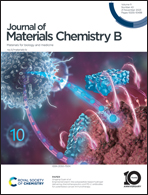Co-assembly-mediated biosupramolecular catalysis: thermodynamic insights into nucleobase specific (oligo)nucleotide attachment and cleavage†
Abstract
Gaining control over the stability and cleavage of phosphoester and phosphodiester remains a matter of interest for their application in biotechnology to oligonucleotide-based therapeutics. Herein, we report an efficient unactivated phosphoester hydrolysis (stable mono/di/tri/cyclic nucleotide to nucleoside conversion) via a biosupramolecular system comprising of a non-covalent complex of enzyme, alkaline phosphatase (ALP), and Zn(II)-metallosurfactant. We also demonstrate the nucleobase selective activation or inhibition of ALP-mediated oligonucleotide digestion process using that complex. The higher binding affinity of Zn(II)-containing headgroup with phosphate-containing substrate enhanced the effective substrate concentration surrounding the enzyme, which, in turn, results in a drastic decrease in the Michaelis constant (KM), along with an increase in the turnover (kcat). The catalytic activation or inhibition of nucleobase-specific oligonucleotide digestion depends on the hydration, localization of the substrates, and viscosity of the resultant co-assembly upon substrate binding with the enzyme-metallosurfactant complex. Additionally, through isothermal titration calorimetry experiment, we demonstrate enthalpy–entropy change during both the supramolecular binding of (oligo)nucleotides and simultaneous activation/inhibition in catalytic cleavage. Overall, it showed the possible modularity of Zn(II)-mediated biosupramolecular interaction, describing intrinsic thermodynamic aspects in developing complex biocatalytic circuits with nucleobase-specific oligonucleotides inputs, which are relevant in designing nucleic acid-based cargo for drug delivery and bioimaging.



 Please wait while we load your content...
Please wait while we load your content...